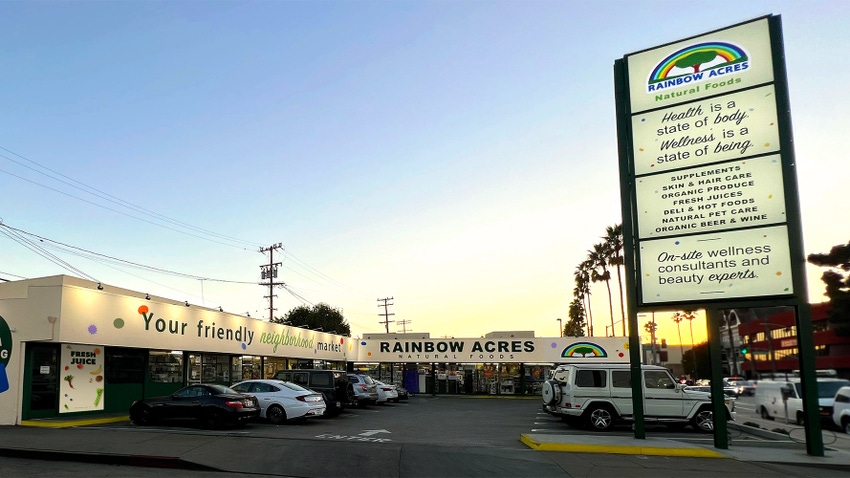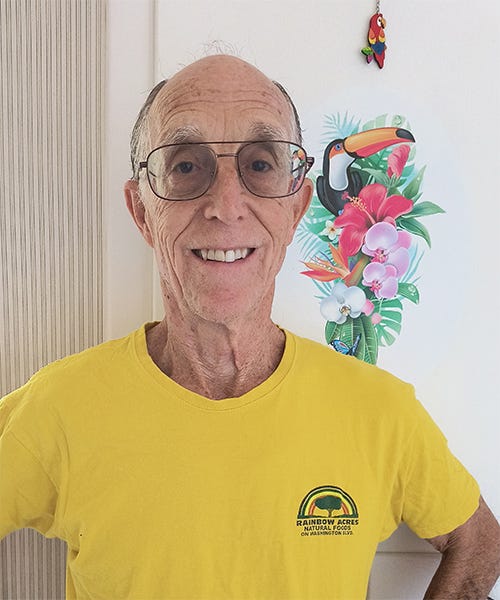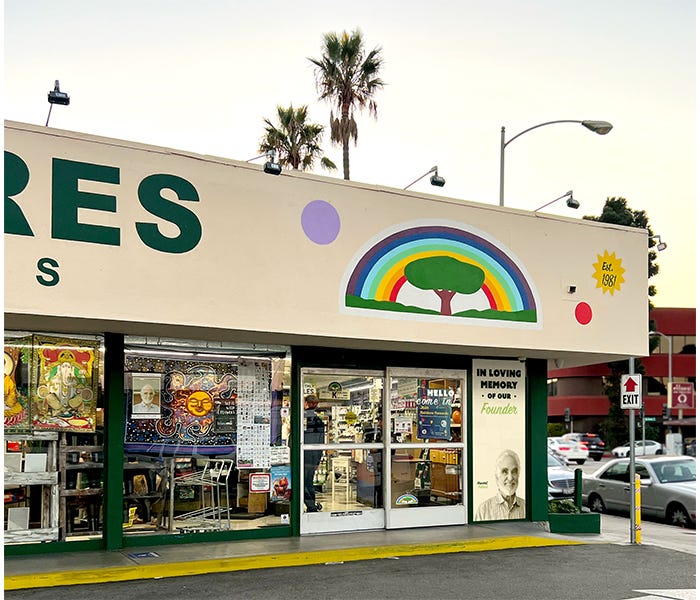March 6, 2024

Doug Frank didn’t launch Rainbow Acres Natural Foods, but he’s been the chief architect and captain of the West Los Angeles mainstay since 1983. The store was founded two years earlier by the late Howard Pollack, a pioneering natural products wholesaler and industry leader who passed away in 2022. He recruited Frank to serve as general manager, a role he maintains to this day.
In the early days, the two men weren’t bound by any strict template for what a natural products store should be. Rather, they focused on serving the local community and built their inventory around customers’ needs. Frank, with a wellness background, created a stellar supplements section, securing a loyal following that has helped Rainbow Acres thrive for more than four decades.

Doug Frank, general manager of Rainbow Acres in Los Angeles, California
What led you into natural products retail?
Doug Frank: I was a college student during the Vietnam War, and I was feeling a bit ambivalent about college at that time. I had already stimulated a love of natural foods, but here in Southern California, there weren’t a lot of options back in 1971. Then a mall opened up in my neighborhood, and inside was your basic, generic mall natural foods store of the time. I started working there, and after I got my retail stripes, I went around the country opening up locations in other malls.
After working for that company for several years, I came up to Los Angeles and started working for Howard Pollack, who’d opened Rainbow Acres in 1981. He was a private-label guy, not a retailer, so he said he could really use some help. I have been at this store since 1983, and we’ve gone through a ton of evolutions over the years. We’re very unique.
How is Rainbow Acres unique?
DF: We’re just down the street from where Howard lived—that was one of the attractions of renting the space. At first, we had a little under 1,200 square feet of this shopping center. At one time it was a bank, so there are lots of unique things, like a safe in the middle of the building. We had a very generous landlord who allowed us to knock down walls, so as other tenants vacated the building, we took over their spaces. So, the store is an unusual configuration. Now we’re at 7,700 square feet of retail space, and we occupy a little over 14,000 square feet total with our big kitchen and bakery.
Did the store sell mostly supplements at first and later expand into grocery?
DF: No, almost the opposite. Howard’s initial vision was to have no shelving. It was going to be all palates and case stacks: “stack it high and watch it fly.” He also said he’d never have refrigeration, but eventually he put it in. Then before I knew it, he was asking me to help set up a nutrition department, and that was even before I started working for him.
So, the whole thing was evolutionary, based on the neighborhood and customer input. At one point, people were asking for stuff to eat, so Howard started making soup at home and bringing it to the store in a crockpot. This was around the same time that Mrs. Gooch’s was opening up. So, we were definitely part of establishing the footprint for natural foods in this part of Los Angeles.
You were pioneers!
DF: Well, I don’t think we were necessarily on the forefront. We weren’t like, “We have a philosophy and we’re pushing it.” We were just trying to provide a service for our local customers, and they’d come to us saying, “Can we get organic bananas instead of commercial bananas?” Although Howard was a pioneer in Southern California in terms of being in the wholesale business for natural foods, as a retail store, his philosophy was, “I just want to sell a bunch of merchandise that hopefully is available from a natural food distributor.” If I told him there was demand for something, he’d say “go for it.”

What has made Rainbow Acres thrive for long?
DF: Well, like you probably hear from every retailer, we’ve always had a strong focus on customer service. And once we started putting energy into wellness and HABA, that’s how we really established ourselves. We are in “the Bermuda Triangle” of Whole Foods. We were here first, but as Whole Foods built one store, then a second, then a third, we rode the tsunami of them temporarily stealing our business—and it was our wellness department that kept us afloat during those harder times. We had already established a reputation with it, and people didn’t abandon us. They might have bought a bag of chips for a great price at Whole Foods, but for nutritional advice, they still depended on us.
Sounds like you had some very loyal shoppers—and still do?
DF: For organic, non-GMO and all of those things, we weren’t the first. But because we adopted them, our customer base has supported us through thick, thin, Covid, you name it. We’ve always managed to ride the wave and survive. A lot of that has been our ability to adapt. If you listen to your shoppers and pay attention to trends, you’ll do great in this business. If you don’t, then you’re going to have a rocky future.
Did Rainbow Acres partake in the campaign for DSHEA’s passage?
DF: Howard was a board member of [National Nutritional Foods Association] during that whole brouhaha, so obviously, we were on board in a big way. We did stuff like put police tape around our building to make it look like we were being investigated. That was a little dramatic, but we got a lot of signatures. Howard was at the Kiwanis Club and other organizations in town saying, “If you want your natural food store to survive in this day and age, you need to write your local congressman and get on board.” Obviously, it worked.
How do independents remain relevant moving forward?
DF: Independents need to be more community oriented. I mean, obviously, you’ve got to serve your community—that’s a given; you don’t say in business if you don’t do that. But we also need to be active members of the independent retailer community. We belong to INFRA, and it has had a huge impact on us. We are members of the Positively Natural [Network], and they are making an impact for us. We believe in strength in numbers, and we’ve learned so much from other retailers. If you try to go it alone, you’ll have harder time than if you’re a member of an organization that helps you along.
About the Author(s)
You May Also Like
.png?width=700&auto=webp&quality=80&disable=upscale)




